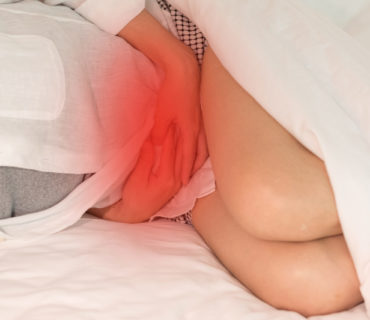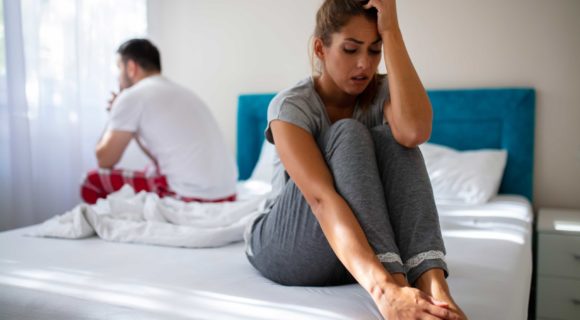If you encounter pain after sex, know that you are not alone. This is a common problem and there is almost always something that can be done to prevent or treat the underlying cause so that you can have a healthy, enjoyable sex life.
Reasons Why Women Experience Abdominal Pain After Sex
There are many reasons why women would have abdominal pain or pelvic pain after intercourse. The following are a few of those reasons. If you have cramping or pain and don’t know the root cause, it’s important to see your doctor to be examined, diagnosed, and treated.
You’re Not Aroused Enough
Arousal is an important part of ensuring sex is painless and enjoyable. During arousal, the cervix and uterus rise, the vaginal walls become more elastic, and your vaginal lubrication makes it easier and more comfortable for your partner’s penis to enter and move inside of you.
If you fail to have enough foreplay or aren’t fully aroused, sex can be uncomfortable or even painful. Your vagina will be tighter and dryer, and the cervix and uterus won’t have the time needed for them to rise and make room for your partner, causing pain after intercourse.
Pelvic Inflammatory Disease
Pelvic inflammatory disease (PID) is caused by sexually transmitted bacteria such as gonorrhea and chlamydia or any general pelvis infection. The infection can spread through the reproductive tract, create the inflammatory swelling and cause pain in the pelvis and pain during or after sex. It may also cause vaginal bleeding after intercourse, fever, and a foul-smelling discharge.
P.I.D. is treated with a combination of abstinence and antibiotics for you and your partner. Until both partners are cleared of the infection, condoms must be used to prevent transmission back-and-forth between partners.
Endometriosis
Endometriosis is a condition when the endometrium that lines the uterus spreads to areas outside of the uterus. The endometrium can grow and cover parts of your reproductive tract, and in severe cases can grow on the other organs. The cause of endometriosis is not fully understood.
Pain during and after sex, painful menstruation with heavy bleeding, pain during bowel movements or while urinating, and infertility are a few of the symptoms of endometriosis. Endometriosis can be mild or severe and treatment options vary. If you have experienced these symptoms, it’s time to see your gynecologist. You most probably will be offered the diagnostic laparoscopic surgery. There are surgical and pharmacological options for the treatment of endometriosis that might be quite effective and might stop your sexual activity discomforts.
Uterine Fibroids
Uterine fibroids are growths on the uterus. While most of these are benign, some do become problematic. Fibroids can grow larger than the uterus and can cause pain during and after sex.
Some women are more susceptible to developing them than others. If you are overweight or have a family history of uterine fibroids, you are at an increased risk of developing them yourself. If you have large fibroid or multiple smaller fibroids, there are many treatments that can be done to shrink or remove fibroids. Some of those treatments are non-invasive or don’t require surgery, but for the larger fibroids it could be a surgical excision or uterus removal (hysterectomy).
Ovarian Cysts
Ovarian cysts are quite common and developed during the woman’s menstrual cycle. If you are not on hormonal birth control, your body will ovulate or attempt to do so. During this process, things don’t always go perfectly. If you have a hormonal imbalance, a mature egg may not be released from an ovary and can form a cyst. In other cases the egg is released, but the tissue around the egg seals up prematurely and traps fluid inside. Over time this can harden and form a cyst.
If you have an ovarian cyst, it can cause pelvic pain or the cyst can even burst during or after intercourse and cause abdominal pain. If you have intense pain after each intercourse, see a doctor right away to determine the cause.
A Urinary Tract Infection
If your bladder is inflamed due to a urinary tract infection, also known as a U.T.I., it can make intercourse painful, or you may experience pelvic pain afterward. If you are urinating more frequently, have painful or burning urination, using a washroom at night more than it is usual for you, or see blood in your urine, it’s time to see your doctor.
Left untreated, urinary tract infections can become serious and even life-threatening, because the upgoing infection can reach the kidneys and cause the pyelonephritis or go to blood stream and cause the urosepsis. Treatment is simple (oral antibiotics and drinking lots of water) and will prevent you from getting sicker. It will also make your sexual life much more comfortable.
Bacterial Vaginosis
Although bacterial vaginosis or B.V. is usually not serious, it can be quite unpleasant and includes symptoms like itching and burning, and an unusually colored and fishy-smelling discharge.
B.V. occurs when an overgrowth of bacteria (Gardnerella) occurs in the vagina. Although all the causes for B.V. aren’t known, cross-contamination between the anus and vagina and the practice of douching are common causes.
Douching is discouraged because it can be irritating and good bacteria that protect your vagina from infection get killed, allowing bad bacteria to take over. B.V. needs to be diagnosed and treated by your doctor after the confirmation with the vaginal swab.
Sexually Transmitted Diseases
Certain sexually transmitted diseases cause pelvic pain and cramping. If you have had unprotected sex or sex with multiple partners or with someone else who has multiple partners, you are at a greater risk of getting an STD infection. Most common infections are syphilis, gonorrhea, chlamydia and trichomoniasis.
Common STDs can often be treated with antibiotics and should be accurately diagnosed by your doctor. If you know that you get an STD or have been with someone who has, let your current and past sexual partners know and use condoms when having sex until everyone is cleared of infection.
What You Can Do
There is almost always something that can be done to improve and prevent pelvic pain during or after sex. There are some things that you can try on your own, but it is always good to be checked out by a doctor to find the correct diagnosis.
Things to Try on Your Own
First and foremost, wear condoms if you or your partner have not been tested for STDs and infections that can cause PID or if you are not in a monogamous relationship. Condoms are very effective if worn consistently and can prevent the spread of many diseases.
You can also prevent abdominal pain after sex by taking your time to become fully aroused before you have intercourse. Engage in foreplay and have open communication with your partner. If you aren’t ready, let him know. When you aren’t aroused, you won’t enjoy the experience and may feel pain during and after sex.
When See Your Doctor
- Endometriosis varies in severity, so if you think you might have it, speak to your gynecologist. You will likely be referred for ultrasounds and, if all other possibilities are ruled out, you may need a laparoscopy to identify the disease and remove tissue that has grown outside of the uterus.
- Fibroids must be diagnosed and treated by your gynecologist. Each situation is different and there are many treatment options available based on your individual circumstances. Many of them are non-surgical, such as taking hormonal birth control or making lifestyle changes. Your gynecologist will be happy to walk you through your options and answer your questions.
- Some ovarian cysts don’t need treatment, but if a cyst causes painful sex, you do have options. Your gynecologist will need to perform the pelvic exam and order the pelvis ultrasound and to understand what is going on. Than he/she will be able to provide you with options to help you have more enjoyable sex.
- If you suspect you have a UTI, you must see a doctor for treatment. In the meantime, avoid caffeinated beverages and drink lots of water and cranberry juice. Oral antibiotics are usually needed to treat a UTI.
- Bacterial vaginosis requires a diagnosis by a doctor with a vaginal swab. It is treated with oral antibiotics or vaginal gel. To avoid future infections, when you use the restroom, wipe yourself from front to back and don’t use douches. When you wash your perineum, use plain water or, if necessary, a very mild, perfume-free soap (like Castile soap).
- STDs need a doctor’s diagnosis (vaginal or cervical swab and/or specific blood work) and the appropriate antibiotic treatment. To prevent STDs, always use a condom when having sex with someone you are not in a monogamous relationship with. If you are in a monogamous relationship, both partners should be tested for STDs prior to sexual contact.
Pelvic and Abdominal Pain and Sex
If pelvic or abdominal pain after sex gets you down, know that you are not alone and there is almost always a solution to the problem. Work with your gynecologist to find the underlying cause of your pain and a resolution. You can enjoy your sex life again with proper treatment and preventative measures.
Frequently Asked Questions (FAQ)
Is it normal to have pain after sex?
While it isn't normal, it is quite common among women. Discuss your pain with your doctor at your next appointment. He or she will help you find the cause of your pain and treat it effectively.
Why does my cervix hurt after sex?
When your cervix is bumped repeatedly by your partner's penis, it can cause uterine contractions, or the cervix itself can tense up and cause pain. There are several causes, such as the sexual position, your specific anatomy or not being ready for intercourse. Only your doctor can determine the underlying cause of a cervical pain.
What causes pain after sex?
See the section above, titled, "Reasons Why Women Experience Abdominal Pain After Sex" for the possible causes for pain after sex.


